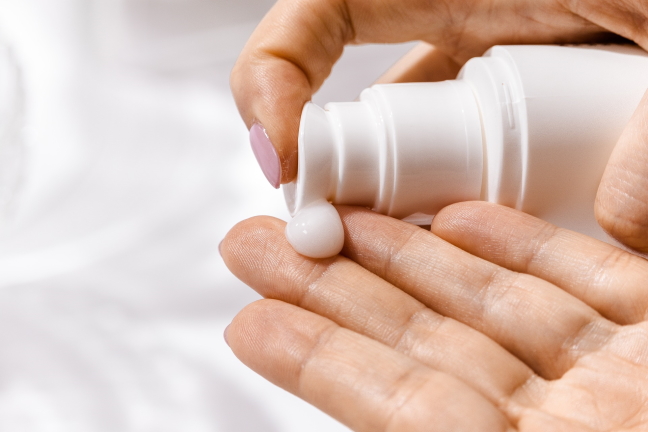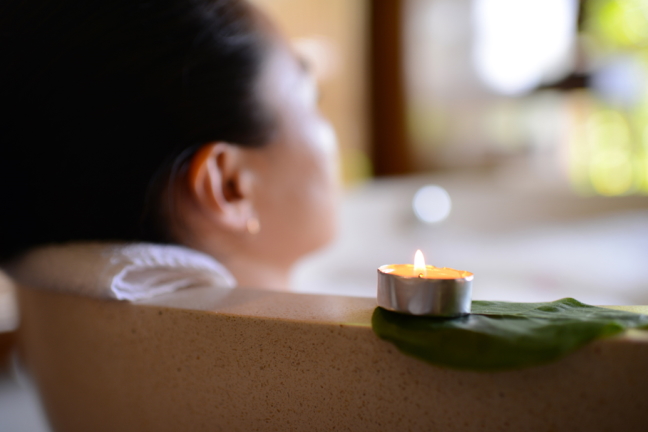Psoriasis is a chronic autoimmune disease that causes red and crusty patches of skin covered with scales. For those living with the condition, upping your skincare regime is more important than ever. While there may be obstacles that get in the way, making minor tweaks to your daily routine can calm flare-ups, promote healing, and help keep your skin fresh and glowing. Here are some useful psoriasis self-care tips that you need to know about.
Keep Your Skin Moisturized
While it may sound like an obvious tip, you’ll be amazed at how keeping your skin moisturized can help with psoriasis symptoms. When you moisturize, this can help reduce dryness, redness, itching, scaling, and soreness. In a nutshell, moisturizing is one of the best things you can do for irritated skin.

Make sure to select a moisturizer based on how dry your skin is. Ointments that are heavy and thick are excellent at trapping in moisture, whereas lotions are thinner and can get absorbed quicker. You may decide on a cream that falls between the two. Patient explains psoriasis in further detail, as well as the additional benefits moisturizing your skin can have on the condition. Their guide will teach you the ins and outs of psoriasis and other methods to use to keep your skin in check.
Take Warm Baths
Many of us enjoy nothing more than a long soak in the bath. If you resonate with this, you should already be aware of the benefits baths have to your psoriasis. A daily warm bath using a mild soap can be fantastic for soothing itchy spots and getting rid of dry skin. Make it a daily mission to take 15 minutes for a soak in warm water. You may like to add oil, Epsom salt, or dead sea salt to the bath. However, whatever you do, ensure the soap and water is mild. If you use hot water, this can be hard on your skin and increase the risk of flare-ups.

When you dry off, try to avoid rubbing your skin with the towel. Instead, you should pat it dry gently. This is because the rubbing action can worsen sores and potentially cause new ones. Before leaving the bathroom, make sure to use moisturizer! For those who don’t have time for a bath or haven’t got one, you can use a cold compress.
Heal With Sunlight
Those with psoriasis can benefit tremendously from getting outdoors and topping up their vitamin D. The UV light in sunlight is great for slowing the growth of skin cells. Therefore, minor doses of sun can be a brilliant way for soothing, improving, and potentially healing psoriasis lesions.

Try to get outdoors a few times each week. To keep your skin healthy and rejuvenated, don’t forget to use sunscreen lotion. Be mindful of how much sun you get as you will be at an increased risk of sunburn and skin cancer if you’re basking under it. What’s more, too much sun can make your flare-ups worse.
Take Things Easy
It’s suggested that high-stress levels can make itching and psoriasis worse. Some people can even pinpoint the first outbreak to a stressful event. You may be able to relieve symptoms by reducing your stress and anxiety.
There are lots of simple and effective ways to lower stress. One of these is practicing relaxation techniques. Deep breathing exercises and meditation may help prevent psoriasis flare-ups. Other ways to bust stress include eating healthier, drinking lots of water, getting more sleep, and regular exercise.
Avoid Scratching and Picking
We’ve all been there. When you feel an itch, your first thought is to scratch. However, if you start scratching, this will open your skin which makes it easy for infection-causing germs to make their way in. What’s more, it can make sores appear where there were not any beforehand. To avoid scratching and picking, it’s wise to keep your nails short.
Picking at your skin can lead to infections. The next time you’ve got an urge to do this, shut your eyes, take a deep breath, and reach for your moisturizer instead. While it can be hard to resist temptation, over time, you will find it easier to ignore the itch.
Stop Smoking
Let’s face it, there are no health benefits linked to smoking. This habit can not only increase your risk of cancer, heart disease, and high blood pressure, smoking cigarettes can trigger a psoriasis flare-up. Of course, you don’t want this to happen to you, so now is the time to pack in smoking for good.
It’s best to speak to your GP or doctor first about ways to stop smoking. This is because your first action may be to invest in nicotine patches. However, these may make your psoriasis worse.
Someone living with psoriasis may wish to add particular steps to their skincare regime. When you follow such techniques, they can help in alleviating symptoms, and preventing flare-ups. While we won’t say you’ll see results overnight, if you take our advice above into account and try them out, they should be somewhat useful in managing the condition and keeping your skin healthy.